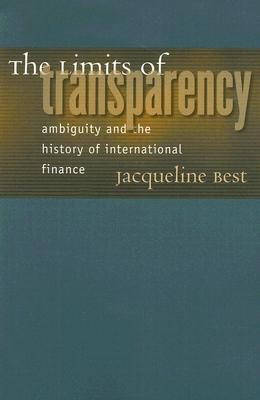
- We will send in 10–14 business days.
- Author: Jacqueline Best
- Publisher: Cornell University Press
- ISBN-10: 0801473772
- ISBN-13: 9780801473777
- Format: 23.6 x 15.7 x 1.5 cm, softcover
- Language: English
- SAVE -10% with code: EXTRA
Reviews
Description
A decade of crises has reminded us of the fragility of the international financial system. Conventional wisdom holds that uncertainty is the basic problem of financial governance, and attempts to contain ambiguity have dominated recent financial reform efforts. Jacqueline Best, however, contends that ambiguity can play a valuable role in international political and economic stability. The stability of the postwar era depended, Best suggests, on a carefully maintained balance between coherence and ambiguity. In her view, the collapse of the Bretton Woods exchange-rate regime was caused in large part by the increasing rigidity of the system and its corresponding inability to accommodate ambiguity.This is a novel argument in an area much discussed by economists and political scientists. Their debate has focused on uncertainty as a technical problem and transparency as the solution. Although such policies are presented as technical, Best demonstrates that they are also political, have cultural consequences, and may prove counterproductive. Rather than assume that transparency is the ultimate goal, Best argues, we must recognize that ambiguity is pervasive, substantive, and potentially constructive. To read this book is to comprehend more deeply the ways in which politics is fundamental to economic theory and practice and to understand why the economy requires political leadership in order to flourish.
EXTRA 10 % discount with code: EXTRA
The promotion ends in 20d.18:03:34
The discount code is valid when purchasing from 10 €. Discounts do not stack.
- Author: Jacqueline Best
- Publisher: Cornell University Press
- ISBN-10: 0801473772
- ISBN-13: 9780801473777
- Format: 23.6 x 15.7 x 1.5 cm, softcover
- Language: English English
A decade of crises has reminded us of the fragility of the international financial system. Conventional wisdom holds that uncertainty is the basic problem of financial governance, and attempts to contain ambiguity have dominated recent financial reform efforts. Jacqueline Best, however, contends that ambiguity can play a valuable role in international political and economic stability. The stability of the postwar era depended, Best suggests, on a carefully maintained balance between coherence and ambiguity. In her view, the collapse of the Bretton Woods exchange-rate regime was caused in large part by the increasing rigidity of the system and its corresponding inability to accommodate ambiguity.This is a novel argument in an area much discussed by economists and political scientists. Their debate has focused on uncertainty as a technical problem and transparency as the solution. Although such policies are presented as technical, Best demonstrates that they are also political, have cultural consequences, and may prove counterproductive. Rather than assume that transparency is the ultimate goal, Best argues, we must recognize that ambiguity is pervasive, substantive, and potentially constructive. To read this book is to comprehend more deeply the ways in which politics is fundamental to economic theory and practice and to understand why the economy requires political leadership in order to flourish.


Reviews